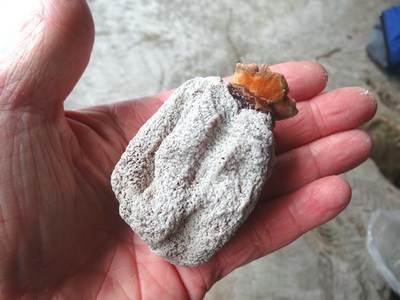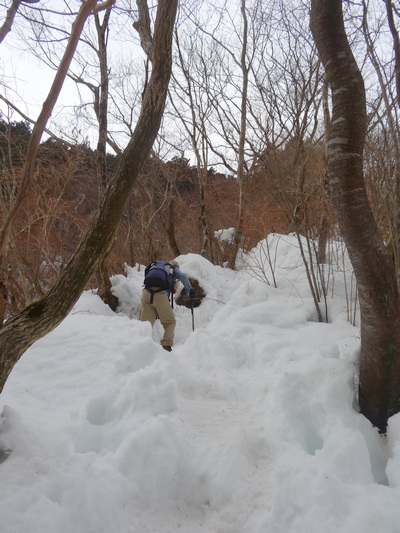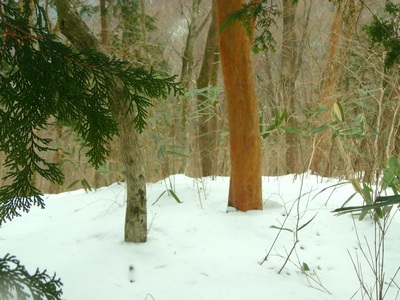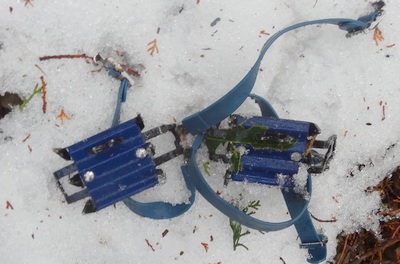February 22. Ryuso Mountain. The snow had erased many of the metal steps up the steepest grade, but in the process had evened out all the rough edges of the trail (as if someone had gotten a good hold on the top of the trail and given it a really good shake) . The walking seemed easier . . . with crampons on, that is.
On the first leg of the climb, about halfway up to Hozumi Shrine, I passed a certain man. We recognized each other.
“Just a moment,” he said. He stripped off his backpack. He reached into a pocket. “Have you ever heard of hoshigaki?” he asked, in Japanese.
Indeed I had. Dried persimmons. And I knew how this conversation was going to go:
“Yes, I have.”
“Can you eat them?”
“Yes, I can.”
“Here.”
“But you only have one. You’ll need a boost of energy farther up.”
“I already had one. One was enough. Here.”
So I took it. Told him thanks. A couple of times. Said a few words about the snow. Then went on at my own pace.
It was a moment of kindness, and it’s surely best to leave it at just that. So I’m finished. This is the end. Right here. Stop reading.
Yes, it’s probably best just to keep moving, to keep heading up the mountain one step at a time … even when you get to the snow-erased steps, the metal handrail shin-high.
But neurotic me will pause for a second. You see, the man only had ONE hoshigaki. And he would certainly meet lots of folks on the mountain. And they’d all be glad to have a dried persimmon as plump and delicious-looking as the one he’d given me. But he’d singled me out–the foreigner, the American–for a special gift.
Expatriots know this to be a fact: it doesn’t matter how many years, or decades even, you’ve lived in Japan, people who see you for the first time will, at least initially, be unaware of the length of time you’ve spent in their country. On the mountain, again and again, folks will spot you, look a bit surprised, then ask you, maybe in English, maybe in Japanese, “Where did you come from?” And you, because you’ve lived at the foot of the mountain for fifteen or twenty or twenty-five years, will hesitate, wonder if the answer matters, before saying, “America.” Or Canada, or Switzerland, or Argentina, or Kenya.
But I remember the first time I met the man with the hoshigaki. I’d gotten to the top and had been invited to sit with a group of guys, and most of them had quickly jumped in with the typical questions and comments,, ones that began with stuff like “We Japanese …” and “You Americans…” and even “Those Koreans …” and “Those Chinese …” I sat there smiling as much as possible, only objecting to the generalizations when I thought I could do so politely, when I could do so with a light-hearted sort of comment. The man with the hoshigaki was at the table, too. He remained silent. But once or twice, he gave me an apologetic look . . . slightly embarrassed, I thought, that the conversation was going as it was. Just like me, he seemed to think, it was a bit silly, and involved a bit too much needless stereotyping, but was more or less harmless, had sprung from hearts far from unkind, and was best taken in good faith.
It was easy to remember his face. And I felt grateful the next couple of times we bumped into each other–when he shared some small(?) portion of his provisions with me.
Some people may say it’s easy to be kind on the mountain. Maybe it is. Everyone wants to get to the top–and will. Everyone wants to share the experience.
As I walked up, step by step, at my pace, as the distance between the gift bestower and me grew larger, I found myself torn between sinking my teeth into the dried persimmon right then and there–and holding onto it for a while, maybe carrying it back to town with me. I could take it here and there, hold it out for friends and colleagues and students and even strangers to see, and exclaim, “Look at this! It’s beautiful! A man on the mountain gave it to me! Just gave it to me! Gave it to me.”
Up the mountain I went. I remembered the old Creedence Clearwater Revival tune. “I started singing (quietly … I wouldn’t purposely torture other hikers): “People on the mountain are happy to give. . . . Hiking . . . hiking . . . hiking up the mountain!”
Is there such a thing as altruism? I’d like to believe there is.
I’d like to believe there is whether there is or isn’t. We could analyze the hoshigaki giver’s motivation but why would we want to? I forget what you call this sort of thing in the world of philosophy, but sometimes there’s talk of a mysterious box. You can’t see inside the box, but you can see the crank poking out the left side, and a shaft tipped with feathers sticking out the right. You can see, when someone turns the crank, the feathers spin round and round. Your immediate intuition tells you that there is one straight shaft going through the box, from end to end, and this is why the feathers turn when the crank does. But if you stop to ask yourself if you can be absolutely, positively sure that that’s what’s inside the box, well, you can’t. There could be all sorts of complicated engineering feats on exhibition inside that box. Dozens of gears and springs and joints and levers and cables, and maybe motors, maybe even laser beams, all kinds of stuff could be inside that box. But probably not.
Sometimes it’s better not to complicate things. The man hands you a dried persimmon. You take it. Say thank you. Walk on. Accept it, simply, as a good thing.
I was tempted to say it was “a small, good thing,” but have decided, very consciously, not to.
Almost every year, I teach Raymond Carver’s “A Small, Good Thing,” a short story that contains a scene as painful as any I’ve read, but ends warmly . . . literally warm.
The plot is fairly simple. On his birthday, a young boy, Scotty, walks out into the street and is knocked down by a car. At first, the doctor thinks there’s no serious injury, but eventually it becomes clear that Scotty has slipped into a coma. His parents, Ann and Howard, watch over him. In the meantime, a baker is upset that Ann has never picked up the birthday cake she’s ordered. He calls when Howard is home to freshen up, but Howard has no idea what cake the baker’s talking about and hangs up on him. After Scotty dies and Ann and Howard have returned home, the baker calls for the third or fourth time. “Have you forgotten about Scotty?” he asks, cryptically, not identifying himself, and hangs up. Ann feels tortured by what she takes to be the caller’s unforgivable cruelty, and when she finally realizes that it was the baker on the other end of the line, she decides to confront him. She and Howard head for the bakery.
First, the painful scene. Ann and Howard have waited by Scotty’s bedside. The periodic reports from the doctor have become more worrying. And then suddenly Scotty comes out of his coma. His eyes open. Ann and Howard lean over his bed. Howard takes his hand. Ann kisses his forehead. And then . . .
“The boy looked at them, but without any sign of recognition. Then his mouth opened, his eyes scrunched closed, and he howled until he had no more air in his lungs. His face seemed to relax and soften then. His lips parted as his last breath was puffed through his throat and exhaled gently through the clenched teeth.”
And then the ending. It’s midnight when the baker sees Ann and Howard walk through his front door. He thinks they must be drunk. Their anger is tangible. He reaches for a heavy rolling pin. But when Ann says, “Our son is dead,” the baker suddenly understands all, including how much his telephone calls must have intensified her anguish. He puts down the rolling pin. He clears a table. He has them sit. And he apologizes.
“‘You probably need to eat something,’ the baker said. ‘I hope you’ll eat some of my hot rolls. You have to eat and keep going. Eating is a small, good thing in a time like this,’ he said.”
“He served them warm cinnamon rolls just out of the oven, the icing still runny. He put butter on the table and knives to spread the butter. Then the baker sat down at the table with them. He waited. He waited until they each took a roll from the platter and began to
eat. ‘It’s good to eat something,’ he said, watching them. ‘There’s more. Eat up. Eat all you want. There’s all the rolls in the world in here.'”
Ann and Howard eat. The three of them begin to talk. The baker talks of his own loneliness. He’s never had a wife, never had a child.
“‘Smell this,’ the baker said, breaking open a dark loaf. ‘It’s a heavy bread, but rich.’ They smelled it, then he had them taste it. It had the taste of molasses and coarse grains. They listened to him. They ate what they could. They swallowed the dark bread. It was like
daylight under the fluorescent trays of light. They talked on into the early morning, the high, pale cast of light in the windows, and they did not think of leaving.”
I have two thoughts I’d like to share about this story. The first has to do with the first phone call the baker makes. He asks Howard about the cake. But when Howard tells Ann about the “prank” call, he only says that some “creep” called. When she asks who was calling, Howard doesn’t mention that it was some creep calling about a cake. If he had, the baker’s cruel anonymity could not have become the key part of the story that it does. It’s possible, given his anxiety level, that Howard wouldn’t have made the cake/birthday connection himself, and it’s possible that he wouldn’t have mentioned the cake when Ann asked him who it was that was calling, but for me personally, his not mentioning it strains believability a little bit.
But even if that can be considered a minor hitch in the plotting, it wouldn’t really bother me. Because I can see what goes into the box. Carver draws it very clearly:
A boy, a cake with rockets. An accident. The hospital. All the waiting. The helplessness. A boy’s last breath, “puffed through his throat and exhaled gently through the clenched teeth.” Loss. Disbelief.
And I can see what comes out:
Contrition. An apology. Chairs around a table. Warm cinammon rolls. A warm dark loaf. Small good things.
If the gears inside the box are catching a bit, if there’s a faint creaking or clicking, well, it doesn’t matter all that much to me.
The second thought is really a question. Why is the story called “A Small, Good Thing”? Why not just “A Good Thing.” Because I think there is nothing at all small about the baker’s apology, his opening up about his lifelong loneliness, his offering those cinammon rolls. I can’t know what Raymond Carver himself would have said, but I’d like to think that he too thought that this “small, good thing” was really just a good thing, that when the baker says to Ann and Howard, “Eating is a small, good thing” (the most polite thing he can say to a man and woman who have just suffered the biggest loss they could imagine), Carver is expecting us to think: No, no! it’s not a small, good thing, it’s a big small, good thing.
In education, an awareness of small good things, the awareness of the possibility of a small good thing, should not be underestimated. Often, students ask me, “How can I improve my English?” The obvious answers are, “Practice!” or “Use it!” Students, though, like for you to imagine exactly where they are in their development and how much they can handle–and to give them the perfect prescription for their imperfect language-learning constitution. “Look over the examples of subject-verb agreement errors on pages 36-37, then find and correct, by yourself, the errors in the essay on page 38, then write your own essay, 300 words, and give it me.” Or, “Memorize these greetings: ‘How’s it going?’ ‘How you doing?’ ‘What’s up?’ Say each a hundred times in front of a mirror. Check out your expression. Ask yourself if you want to talk to that person in the mirror. Then, assuming you feel like it, greet me with one of the expressions every day for the rest of the semester: “Hey, Steve . . .”
Reasonable tasks for reasonable steps forward on the long, hard road to acquiring a second language, especially for those who probably didn’t start learning one at a young enough age.
But perverse me, I’m always tempted to be more provocative.
“How can I improve my English?”
“Good question. Do you want to be a good person?”
“What? Umh, well, yeah, I guess.”
“Well then, why don’t you start by imagining a small, good thing you could do were you able to use English. A small, good thing that you’d like to do. One that would make you feel good about yourself.”
I tromped back down from Monju Peak, through the icy snow, crampons the greatest invention ever, and back up Yakushi Peak.
Along the ridge, I crossed paths with the hoshigaki man. He had hooked up with another guy. I wasn’t sure exactly what to say, but I wanted to say something. I turned to his new walking buddy and said, “He is such a kind man. He always gives me something. Today, he gave me a dried persimmon.”
I felt a bit awkward. I didn’t know why I hadn’t just looked the hoshigaki man in the eye and said, “You know, you are a very kind man. You’ve made me happy three or four times now. Thank you.”
The hoshigaki man said something. I couldn’t catch it all. But I definitely heard, near the end of his utterance, “Jesus Christ.” He saw that I hadn’t caught what he’d said. He repeated it.
“Giving is our salvation. That’s what Jesus Christ said.”
We were pausing along the ridge. We would not pause forever. There was no time to stare off and consider what might be inside the box, no time to bust it open, to see what combination of gears and springs and joints and levers and cables were inside. No time to wonder, is he a Christian? Is he proselytizing? Or, does he think that, I, as an American, am likely a Christian, and it’s proper etiquette to show some respect to my faith? Or, given the Garden of Eden and the Garden of Gethsemane, given the Book of Job, given the Crusades, given Buddha, given Shintoism, given the black ships and Little Boy, given Barefoot Gen and his father’s disdain for the bamboo spears, given Manifest Destiny and comfort women, given rapist rats in coke-bottle glasses and weak-bellied demon-beasts, given all those who believed their God deserved a capital G and all those who believed their leader was god (or something of the sort), what can this dried persimmon mean?
Thank god, there was no time for that! There was only a split second, only enough time to think, what the hell, there is a crank, and there are the spinning feathers–what could there be but a straight, sturdy shaft connecting the two? Only time to say . . .
“Soh shinjimashoh.” Yes, let’s believe that.
If you want to believe in the complexity within the box, you might ask yourself what the that in my response referred to exactly. I’ll only say that it had nothing to do with Jesus Christ. . . . Or maybe everything.
It was easy to see how the snow had charmed hikers that day. People are always friendly, but that day they were definitely more talkative than usual. Halfway back to the shrine, I passed a guy and two gals, maybe in their late-twenties, on their way up. They had on crampons and looked accustomed to the grade. Still they asked me about the footing. They asked me about the two different trails. Both were passable, I said. The two trails come back together before you get to the ridge, I said. Just take it a step at a time, I said. For a moment, neither they nor I seemed in any hurry. Then we both went on in our different directions.
A few minutes later, I came to a teeny weeny shrine on the left side of the trail. A square block of concrete the size of a loaf a bread (let’s say, for fun, a warm loaf of bread). Topped with a piece of concrete the shape and size of a throw pillow on a sofa–a pretty big sofa. Topped with a mossy wedge-shaped stone, a roof slanting from back to front. I walk by this tiny shrine all the time. But the way it was popping out from the snow, well, it looked like it had just sprung up from the ground, like some unassailable mushroom. I stopped for a moment, suddenly wondering if there might not just be somebody listening.
Then the snow disappeared.

Back home, I took the persimmon out of my pocket. No, I wouldn’t take it to the university the next day, wouldn’t show it to students, wouldn’t shout out, “Look! Don’t you see! It’s a small, good thing!”
But it was a small, good thing just the same. It was a good thing just the same.
It was like biting into a gummy bear. It was sweet, but not too sweet. As I chewed, I saw the man’s face. I saw, inside the box, the straight shaft. In my imagination, it was a shaft made of bamboo.






Nice. I don’t think you need to change anything. Well, maybe except to say that crampons are not necessary.
Kyle, thanks for the comment. Hey, I’ve learned my lesson about crampons. Us young puppies do that you know, learn things. . . . But I did see some folks without crampons, and I haven’t read in the newspaper about anyone dying.